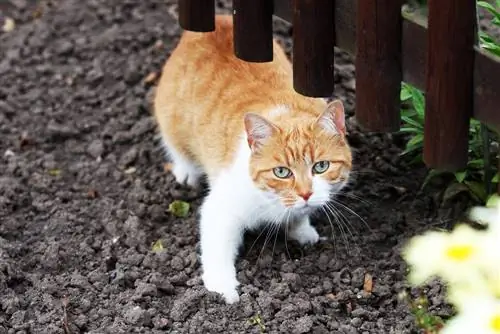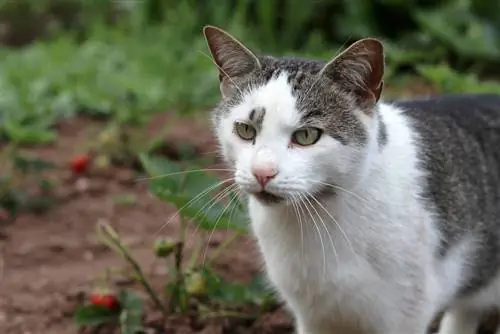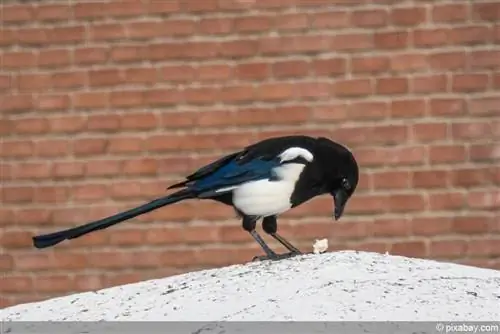- Author admin caroline@plants-knowledge.com.
- Public 2023-12-17 03:39.
- Last modified 2025-01-24 12:45.
Around 15 million cats live in Germany alone. According to this, on average every third household has a cat. And many of them are outdoor animals. Fences and walls hardly represent an obstacle for the animals. That's why it can happen that the velvet paws become a nuisance for some garden owners. But you don't have to bring out the big guns to combat the cat plague.
He alth aspects
They dig up seedlings, dig holes in the beds and leave their shops and scent marks everywhere. If the cats destroy entire new plantings, it can be quite annoying. What is much worse, however, is that cat feces can lead to he alth problems. Some people have decided against having a cat as a pet for good reason because they suffer from an allergy to animal hair. Cats can also transmit pathogens such as toxoplasmosis, which is particularly dangerous for people with weakened immune systems and pregnant women.
Gentle measures
If you want to do something about cat excrement in your garden, you should first consider your preferences. A cat loves soft, dry soil in which to bury its business. Freshly raked flower and vegetable beds are therefore a welcome toilet that is also available around the clock. One reason why professional gardeners also use methods that are safe for cats and nature. For this reason, you make it as uncomfortable for the animals as possible if you cover the bed with fleece or rabbit wire. It also helps keep the soil moist.
Bark mulch
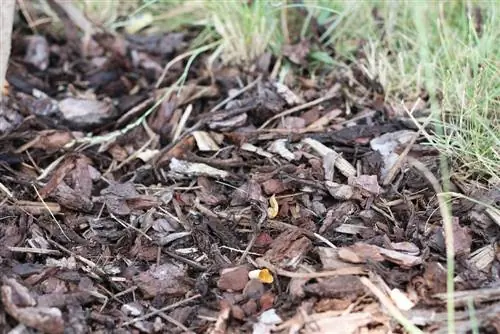
Most cats react quite sensitively to the smell of bark mulch. The shredded bark of trees is available at garden centers or hardware stores. Using bark mulch doesn't necessarily keep cats out of the garden, but it does prevent the animals from using your beds as a litter box. If you spread a thin layer in the beds, you kill two birds with one stone. Not only do they keep cats from doing their business here. They also do something good for your plants because bark mulch protects the soil from drying out and keeps weeds away. Alternatively, you can also use brushwood, pebbles or grass clippings to cover the beds. This makes it more difficult for the animals to find a suitable place.
Spices and essential oils
Cats are equipped with a highly developed sense of smell. Various fragrances are suitable for defense against this, which the sensitive nose is not at all comfortable with. Although these so-called cat repellents are very efficient, they must be renewed regularly as rain or strong sunlight significantly reduces their effectiveness. If a few of the cat's favorite places have emerged, simply distribute some of the following substances there:
- Pepper
- Chili powder
- Cloves or clove oil
- Mint oil
- garlic
By the way:
Did you know that these fragrances are also contained in commercially available products that are offered as natural cat deterrents in spray or granule form?
Plants against cats
It's easier than constantly applying special odorants to keep the cat pest out of the beds with smart planting. In fact, nature has some plant species that can be used to deter cats. While the scent is often not noticeable to humans, the plants keep cats at a distance.
- Piss off plant (harp bush, Plectranthus ornatus)
- Rue (Ruta graveolens)
- Lemon balm (Melissa officinalis)
- Peppermint (Mentha)
- True lavender (Lavandula angustifolia)
- Curry herb (Helichrysum italicum)
Ultrasound devices
Cat ears are significantly more sensitive than human hearing. You also hear sounds that are in the ultrasonic range. Animal repellers take advantage of this phenomenon using ultrasound technology. Despite the complex technology, these devices are relatively inexpensive and are available in stores from just 30 euros. They are battery-operated and switch on automatically via a motion sensor when an animal comes nearby. With an electronic cat deterrent you can not only scare away cats, but also dogs, rabbits, martens, foxes and other small mammals. Birds cannot hear the sounds that we humans can. If the cat has been visiting your garden for a long time, it can take up to four weeks for the cat deterrent to take effect. Some of the devices not only emit a loud sound, but also trigger a flash of light.
Note:
Please remember that many other animals find the ultrasound signal to be unbearable noise. With such devices you have a lasting impact on the habitat of hedgehogs and bats.
Waterjet
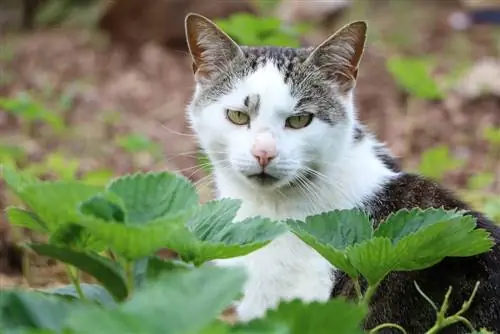
It's no secret that cats are afraid of water. In some cases it is enough to simply direct the garden hose in your direction during your daily watering in summer. If you have children, you can also use their water pistol. Most cats don't forget such treatment so quickly and run away. For stubborn individuals who are difficult to impress, it makes sense to purchase a so-called heron scarer or a water sprinkler. Both devices consist of a motion sensor that is connected to the garden hose. As soon as the device is triggered, it sprays water for a few seconds. The sensor only reacts to warm moving objects and has an effective range of up to 100 m².
Offer alternative
It actually doesn't bother you at all that there are strange cats on your property, if only it weren't for the digging in your beds and the annoying leavings behind?
Then offer the cat an alternative to your beds by placing a box of sand in a place where the animal cannot cause damage. The cat can then use this box as a toilet. The litter box looks particularly attractive if you spread some valerian or plant catnip nearby. Cats feel magically attracted to it and can be lured into a specific corner.
Note:
Clean this “cat toilet” regularly, otherwise the clean animals will soon move back into your beds.

